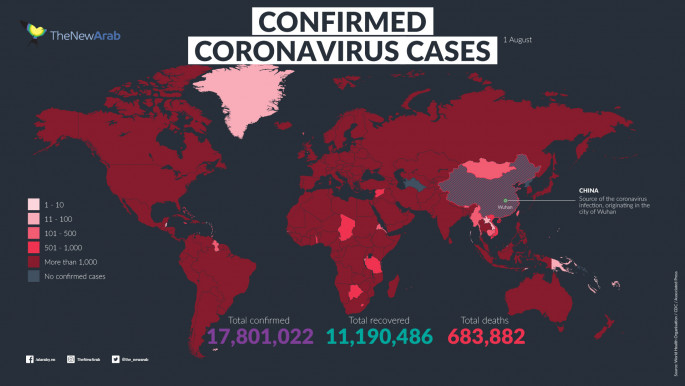The Middle East at war with coronavirus: Top stories from 30 April
Here are five stories you need to know about the coronavirus pandemic and how it is affecting the Middle East on 30 April:
1. Iran's national toll from Covid-19 deaths surges past 6,000
Iran's health ministry said on Thursday that 71 new deaths from the novel coronavirus took the country's official overall toll past the 6,000 mark.
"The number of deaths from this disease effectively crossed 6,000 today," ministry spokesman Kianoush Jahanpour said, addressing the public in televised remarks.
"Considering that we lost 71 of our countrymen in the past 24 hours, a total of 6,028 of those infected with Covid-19 have passed away to date," he added.
This comes as another 983 people tested positive for the virus during the same period, bringing the total to 94,640.
More than 75,100 of those infected had already been released from hospital after recovering, and of those still being treated for the disease, 2,976 were in critical condition.
2. UN warns that 'tragedy beckons' in Syria from virus The UN humanitarian chief said Wednesday that more than 40 cases of Covid-19 and at least three deaths have been reported in Syria, signaling that "tragedy beckons" after nine years of war that has left the country's health care system decimated.Mark Lowcock told the UN Security Council that while the number may sound low compared to other countries, testing in Syria is very limited. The UN special envoy for Syria, meanwhile, called for a lasting cease-fire to fighting in the country.
With millions of people displaced in crowded conditions and without adequate sanitation, he said Syria cannot be expected "to cope with a crisis that is challenging even the wealthiest nations.
|
The government has closed down public spaces in an effort to stop the spread of Covid-19 and kept only "essential" places open – of which ritual baths, or "mikvahs" are included in the list, joining supermarkets and pharmacies.
Jewish women use mikvahs to wash and purify themselves every month after their menstrual cycle ends.
4. Yemen reports first two coronavirus deaths amid warYemen has recorded its first two coronavirus deaths, the health minister said late Wednesday, stoking fears of a major outbreak as war rages on in the country.
The country has been largely spared from the effects of the pandemic, with a total of six cases recorded so far - the first in April in the government-controlled southeastern province of Hadramawt."There was an announcement of five cases of coronavirus today - of those infections there were two deaths," Health Minister Nasser Baoum told Yemen TV.
"We conducted the tests twice, and they were positive," he said. "Therefore, there is no doubt under these worldwide circumstances that we have to announce they were cases of coronavirus until proven otherwise."
5. Egypt adopts a coronavirus 'coexistence plan'Egypt is charting a way out of its coronvirus lockdown, adopting a plan to "coexist" with the pandemic despite a spike in Covid-19 cases and deaths in recent days.
Egypt is planning to gradually re-open shops and restaurants with a review of the situation every two weeks, The New Arab's Arabic-language service reported on Wednesday.
Egypt's Health Minister Hala Zayed outlined the country's "coexistence" plan during a remote cabinet meeting, stipulating that places which carry a high risk of transmission will remain closed.
Electronic card payments, online purchasing, and home deliveries will also be recommended under the plan.
 |
Agencies contributed to this report.
![Coronavirus daily ] Coronavirus daily ]](/sites/default/files/styles/image_345x195/public/media/images/A691077A-4EDC-4D55-906E-50A8A4F02BCA.jpg?h=d1cb525d&itok=WVpl8Drr)




 Follow the Middle East's top stories in English at The New Arab on Google News
Follow the Middle East's top stories in English at The New Arab on Google News

![Israeli forces ordered bombed Gaza's Jabalia, ordering residents to leave [Getty]](/sites/default/files/styles/image_330x185/public/2176418030.jpeg?h=a5f2f23a&itok=_YGZaP1z)
